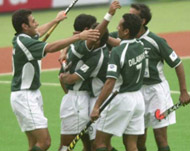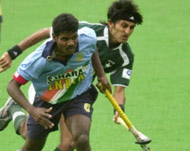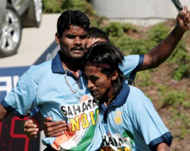Addressing hockey’s decline
There is plenty of soul searching going on in South Asia as the debate rages as to how to stop the decline of hockey in former superpowers India and Pakistan.

Pakistan, a country that was formerly a world power in hockey, have asked the International Hockey Federation for assistance as they attempt revive their flagging international fortunes.
“The FIH has agreed to send us a comprehensive plan which is based on the modern and scientific concept of the game. Hopefully it will allow us to regain our lost glory,” Akhtar-ul-Islam, secretary of the Pakistan Hockey Federation said.
Pakistan finished sixth in the 2006 World Cup won by hosts Germany earlier this month, a poor result for a country that has won four World Cups and three Olympic gold medals.
 |
|
Pakistan at the World Cup |
The nation’s continued failure to add to the trophy cabinet since the 1994 World Cup has seen a real drop in interest in the sport by players and sponsors.
“There is no doubt that we are lagging behind the European teams and Australia because the game has changed and has become more professional and planned,” Islam said.
Looking abroad
The Pakistan Hockey Federation now finding themselves looking overseas for the answer to their current problems as they again consider a foreign coach.
“There is nothing wrong in having a foreign coach if he can lift our standards. We will be discussing this possibility but nothing is final as yet,” the former Olympian said.
Pakistan has in the past had two foreign coaches, Dutchmen Hans Jorritsma and Roelant Oltmans.
The former led them to the Champions Trophy and World Cup titles in 1994, both left in acrimonious circumstances.
For many in Pakistan the lack of recent success is more than they can bear.
For Hanif Khan, the mere mention of Pakistan’s glorious field hockey past brings an emotional response.
“Don’t talk about hockey. I am so disappointed that I play tennis now,” says the 49-year-old Khan, a member of Pakistan’s last Olympic gold-medal winning team of 1984.
 |
|
Once great powers are now |
“It’s useless to talk about a sport where signs of improvement are like sighting a polar bear in a desert.”
Khan was part of Pakistan’s golden era, but he has seen the game decline throughout the region.
“Asia was the dominant force but politics, lack of planning and following European style have led to hockey’s downfall, especially in Pakistan and India,” said Khan.
There was further evidence of the decline at the recent World Cup in Germany, while the hosts clinched their second successive title at the recent World Cup, no Asian team even claimed a podium finish.
South Korea was the best of the Asian nations with fourth, while Pakistan were sixth, Japan ninth and India a lowly eleventh.
India’s decline
India’s abysmal form shows that the decline of hockey is just as concerning across the border.
The country still holds the record for Olympic titles with eight gold medals, but that tally was last added to in 1980.
“The Indian team’s performance in the World Cup is bitter to swallow. Far from fighting to be the best in Asia, the team is now fourth among the continent’s challengers, even behind newcomers Japan,” wrote former Olympian Pargat Singh in a newspaper column.
He claimed the authorities must take responsibility for the dismal performance.
“While this is a wake-up call for the whole fraternity, there should be somebody up there ready to take the blame for this pathetic fall,” he wrote.
 |
|
A rare moment of joy at the last |
But despite the public pressure, India’s hockey chief Kunwar Pal Singh Gill maintains the future is bright, especially with him at the helm.
Former Pakistani Olympian Mansoor Ahmed disagrees.
“Governments should appoint people who know hockey,” said Ahmed.
“India has a hockey supremo who doesn’t know the sport and as the famous adage goes: a victory has many fathers but a defeat is an orphan. Hockey has lost fans,” said Ahmed.
“Both governments should give jobs to hockey players because youth will not take up a sport where they can’t earn money. Instead they play cricket where they earn a livelihood,” said Ahmed.
But not everyone blames cricket for the decline in hockey.
“It is a fact that cricket is more popular than hockey, but has cricket stopped hockey from flourishing?” questioned former Pakistan captain and coach Islahuddin Siddiqui.
“Players and hockey authorities are to blame for the slide and if we don’t take steps quickly, the game is in serious danger because South Asian hockey needs a lift for the betterment of international hockey,” stated Siddiqui.
While there many be plenty of people with opinions on how to better the situation, an actual change for the better may be a long way off.